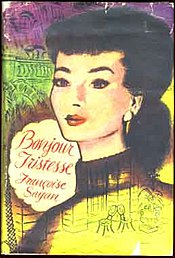Bonjour Tristesse
From Wikipedia, the free encyclopedia
| Bonjour Tristesse | |
|---|---|
 1st English edition |
|
| Author(s) | Françoise Sagan |
| Original title | Bonjour tristesse |
| Country | France |
| Language | French |
| Genre(s) | Novel |
| Publisher | Rene Julliard (France) John Murray (UK) |
| Publication date | 1954 |
| Published in English |
1955 |
| Media type | Print (Hardback & Paperback) |
| ISBN | NA |
Contents[hide] |
[edit] Plot summary
Seventeen-year-old Cécile spends her summer in a villa on the French Riviera
with her father and his mistress. Her father, Raymond, is a seductive,
worldly, amoral man who has had many affairs. His latest woman friend is
Elsa Mackenbourg: she and Cécile get on well. When Elsa comes to the
villa to spend her summer with Raymond, it is clear that she is the
latest of many women whom Cécile has seen enter the life of her father
and exit fairly quickly: young, superficial, and fashionable. Raymond
excuses his philandering with an Oscar Wilde
quote about sin: "Sin is the only note of vivid colour that persists in
the modern world." Cécile says, "I believed that I could base my life
on it",[2]
and accepts their lifestyle as typical. Cécile, at 17, is still
somewhat naive and tries to disguise this by attempting to attract men
of the same age as her father. Her love life is unsuccessful until she
meets a younger man, Cyril, with whom she has a romantic but ultimately
dissatisfying relationship.
Raymond, Elsa and Cécile are spending an uneventful summer together
until Anne Larsen arrives by way of an earlier invitation from Raymond. A
friend of Cécile's late mother, Anne is very different from Raymond's
other girlfriends. She is cultured, educated, principled, intelligent,
and is his age. Raymond eventually leaves Elsa for Anne, and the next
morning Anne and Raymond announce their impending marriage. At first,
Cécile admires Anne, but soon a struggle begins between Cécile and Anne
for Raymond's attentions. The plot begins to focus on the relationship
between the two women. Realizing that Anne will do away with their
carefree lifestyle, Cécile devises a plan to prevent the marriage.
She arranges for Elsa and Cyril to pretend to be a couple, and to
appear together at specific moments in the hopes of making Raymond
jealous of Cyril so that if Raymond decides he wants Elsa back, he'll
leave Anne. Cécile is jealous and desperate for Anne to recognize the
life she and her father have shared, but she misjudges Anne's
sensitivity with tragic results. When Raymond finally relents and goes
into town to see Elsa, Anne leaves, only to drive her car off a cliff in
an apparent suicide after she sees Elsa and Raymond in the woods
together. It is later known that they were kissing.
Cécile and her father return to the empty, desultory life they were living before Anne interrupted their summer.
[edit] Characters
Cécile, a 17-year old girl who lives with her father after her mother died when she was two.
Raymond, Cécile's father, a 40-year old widower and philanderer.
Elsa, Raymond's mistress at the start of the book. She is 29 and tall, with red hair.
Anne, a friend of Cécile's mother, is 42. She is invited to the villa by Raymond when they begin a relationship and get engaged.
Cyril, a 25-year old student at university studying law, who lives with his mother. He is good at sailing and is in love with Cécile.
[edit] Analysis
The book is split into two parts; during the first part Cécile is
very naïve and behaves like a young child. In the second part she is
more mature and acts more like an adult.
One of the most important use of symbols is that of the sea and the
sun. The sea is a maternal symbol and the sun a paternal symbol.
Throughout the book, Françoise Sagan uses the sea to show Cécile is
missing her mother. For example, when she realises that she is losing an
argument with Anne, she runs to the sea, like a child runs to their
mother when something goes wrong.
There are numerous references to the fact that Cécile is missing the
presence of a mother figure. Anne Larsen tries to fill this role; in the
first part of the book Cecile accepts this, but as she "grows up", she
begins to resent Anne.
Some argue that Cécile lacks a father as well, even though Raymond is
present. Raymond's behavior is immature and he doesn't treat his
daughter like a child or even a teenager. He buys her an exotic dress
and takes her to casinos. This behavior confuses Cécile and she does not
know whether she is supposed to act like an adult or a teenager.
When Anne arrives she treats Cécile as a child, adding further confusion to Cécile's life.
[edit] See also
[edit] References
- ^ Camper, Fred (1999). Bodies in Motion
- ^ Gleeson, Sinéad (2004). Bibliofemme review
[edit] External links
- New York Times review of the 1957 film
1 σχόλιο:
....!!!!
σ ευχαριστώ Νόσφυ μου ... :)
Δημοσίευση σχολίου